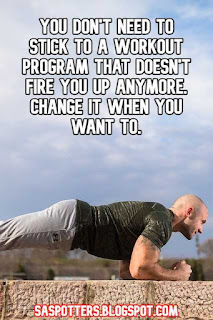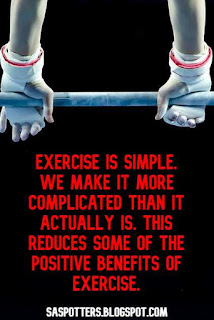Should you adopt a random training program or follow a strict workout guideline?
I have a science background. I have a master’s degree in Exercise Physiology. I also have a bachelor's degree in Psychology.
In these disciplines we tend to look at things that can be measured.
Looking at things objectively is a good thing unless we take the science too far and get over analytical.
I believe that I have taken it too far when it comes to working out in a personal capacity.
I have learned that I can benefit from loosening the reign of control over planning my own workouts.
We can know too much about exercise.
When I was body building in the younger days in my 20’s, I would go to the gym with an idea of what I wanted to do.
If I had a random workout partner there and they joined me, we’d come up with a great workout. This system was a form of loose planning and it worked fine.
 |
| You don't have to think so much. |
We tend to plan our workouts more thoroughly as we learn more about exercise
I started planning my workouts more formally as I evolved with more scientific knowledge.
I started writing exercise prescriptions for myself with this knowledge.
This works great for building a plan for my clients. Around this time, I started writing my own exercise prescriptions as well.
It’s not a bad idea to plan your own workout.
Feeling compelled to stick to your exercise plan perfectly can induce more guilt and frustration than necessary.
I believe it takes the creative juices out of a workout.
Workout plans are great for beginners who need the guidance
When I plan a gym workout for my clients, I need to know their goals. I need to know their limitations, level of experience and the time that they have available per week.
After that the exercises, sets, reps, and potential loads are chosen.
This is good and necessary in the beginning - especially with a novice.
Trainers with experience have all of this all in our heads already.
Some trainers plan too little
Some trainers don’t plan at all. I don’t think that is an appropriate solution either. I call this boot camp training.
We are all different with different goals and one workout design is not best for someone else.
When it comes to planning a workout for new clients, there needs to be a level of workout programming or we aren't being professional as trainers.
It’s another story when it comes to me planning a workout for myself.
It has become a level of unnecessary control.
I’m telling on myself here to potentially assist you.
I believe that the level of knowledge that I learned has made me think that I need to cross all my T’s and dot all my I’s when it comes to my own workout design. Is that even possible?
I know the exercises that are best for me. These exercises change over time.
I know the ideal rep range for myself and the number of sets can really depend on so many things.
Why plan it all out?
The answer is a desire to control for all variables as an act of OCD.
It doesn’t really work because, like everybody else that I would train, the plan needs to be changed.
Sticking to a plan that really doesn’t fire me up is not rewarding.
 |
| Change your exercise plan regularly. |
Training without a plan at all can be good for you
Loose workout plans, random gym workouts and training instinctively
I have recently taken a different approach for my own workouts.
I’ve always been great with clients. I plan their workouts, but I also listen to them.
I get feedback stated covertly or overtly and I change their workout accordingly.
I don't train myself like a new client anymore
I know the days when I like to work certain areas.
I give it thorough consideration while planning my workout schedule.
I think about what is best for me regarding muscle recovery and spacing muscle groups out to get the most of what I need.
I also know what exercises are best for me. I know the rep ranges that are best for me right now and I know how many sets to do.
I leave it at that. I let my brain decide how I want to make it all happen when I get to the gym.
Advanced trainers can choose the exercises as they go once they decide which days they want to work each muscle group
I go into a workout knowing the muscle groups that I’m going to do.
Based on research and my level of buildup, I know how many sets I should do that day.
In other words, I know the basics already.
From there I see what the universe is telling me to do. I trust it.
If I have a yearning to do dumbbell chest presses verses smith machine bench press, it’s a good call to do that instead.
Why does this work? We put more energy into what we really want to do.
It’s not just exercise choice either. It is also structure.
These are no real obligations to continue your current exercise plan
In the past if I wrote a plan to do straight sets on a given exercise but I really felt like doing super-sets instead, I felt the obligation to do what was planned - not what I felt like doing.
I stuck to the plan, but I would not do it with as much fire.
What benefit do you get from sticking to the same exercises? Do what feels right if it fits into the basics of what you want.
There is nothing wrong with spontaneous change when you feel like it.
Doing exercise the way that you feel like might improve your results
I’ve been doing this for a while now. I must say that I’m seeing positive results because of it.
I’ve added some muscle, which has been a goal of mine. I’m stronger and I appear to be recovering from my workouts better as well.
The proof is in the pudding.
I enjoy the workouts more too - which means that I’m more likely to get to the gym.
In my case I will typically get to the gym regardless, but I don’t want to dread it.
Exercise is a privilege, not a chore.
I only plan what muscle groups I should do with average set requirements per muscle group. I don’t over plan.
From there I let myself decide as I warm up or as I move along.
This way my creative juices flow and I come up with some diverse ways to get my sets in.
I stay within the limits of what I know is best for me. I let the rest rip.
Instinctive training doesn't apply to strength training alone
I’ve been doing this with cardio as well.
I know that I shouldn’t do hard cardio every day - and I don’t have any desire to. I know it’s best for me to alternate from moderate to lighter cardio and throw in a couple hard days here and there.
I’ve learned that I don't need to plan my cardio sessions to the second or to the heart rate either.
I know what hard is. I know what moderate is and I know what easy is for me.
I go into a cardio workout knowing that and I'll decide how I want to space it out during the workout.
It works very well and I don’t dread every cardio session. I don’t need to micromanage the exact details of exercise anymore. I just show up.
This may not be that unusual way to train for many people.
Some people just show up and let the workout take care of itself.
This was a big transition for me.
I tend to get pretty OCD and I realize that over planning isn’t necessary. It was cutting into the creativity of what a workout should be.
Exercise is movement and strength. We tend to make it more complicated than it is.
After randomizing my workouts, I've seen much greater growth during my own workout routine.
All the results that I hope for seem to happen when I don't drive myself nuts with over-control.
I’m learning to trust what I already know about exercise and trust my mind to throw me some suggestions when it’s time.
This article is written by Rob Maxwell, M.A. Exercise Physiology, CSCS and ACSM CPT from www.fittothemax.net. Follow him on Twitter.







No comments:
Post a Comment